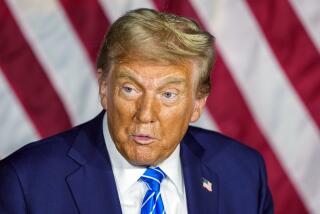Mueller said Trump wasn’t exonerated but left a key question unanswered
- Share via
Former special counsel Robert S. Mueller III had warned that if he were summoned to testify before Congress, he wouldn’t elaborate on the conclusions in his 448-page report about Russian interference in the 2016 election and President Trump’s attempts to undermine the special counsel’s investigation.
And for the most part Wednesday, he didn’t, despite prodding from members of Congress. He stuck to the script wherever possible, responding carefully and slowly, and declined to be drawn into the partisanship that gripped the room.
That didn’t make it boring, however. It was hard not to be shocked again by the damning and sordid findings from his dense, two-volume report. Anyone tuning in should have been appalled anew by the dramatic lengths to which the president went to stop the inquiry into possible obstruction of justice, as well as the efforts that his campaign staff took to capitalize on Russian meddling.
But by sticking to the script, Mueller denied Congress and the country an answer to the central question left hanging by his investigation: Did he believe that Trump obstructed justice? And would he have pursued a case against Trump if there weren’t a Justice Department opinion holding that a sitting president can’t be indicted?
A clear answer to that question would have helped the public reject the president’s incessant and misleading claims that the two-year investigation had found no wrongdoing on his part. More important, it would have helped the House of Representatives decide whether to launch an impeachment inquiry.
For a brief moment during Mueller’s testimony before the Judiciary Committee, it seemed that he had decided to resolve the ambiguity. When Rep. Ted Lieu (D-Torrance) asked him whether the opinion by the department’s Office of Legal Counsel that a sitting president cannot be prosecuted was the reason he hadn’t indicted Trump, Mueller answered: “That is correct.”
But when Mueller testified later Wednesday before the House Intelligence Committee, he amended his answer to Lieu, saying: “What I wanted to clarify is the fact that we did not make any determination with regard to culpability in any way.” This brought Mueller’s position back to the seemingly contradictory conclusions of his report, where he said that because of the Office of Legal Counsel’s opinion and other “difficult issues,” he couldn’t make “a traditional prosecutorial judgment” about Trump.
The former special counsel did make one point exceptionally clear, despite efforts by Republicans on the committee to muddy the waters: Contrary to Trump’s many claims, the report “does not exonerate him.”
Wednesday’s proceedings should serve as a reminder of just how unsavory and disturbing the whole episode was: that the president of the United States was elected with the “sweeping and systematic” help of a foreign adversary; that he repeatedly cheered that foreign power on; that there are numerous examples of ways in which he sought to undermine or obstruct the investigation into Russia’s behavior (even if Mueller is loath to acknowledge that). Hundreds of former federal prosecutors, unburdened by Mueller’s ethical restraints, have come forward to say that there would be grounds for obstruction of justice charges if Trump were a regular citizen rather than America’s commander-in-chief.
Congress has to figure out what to do next, and the decision is a tough one. This page has said on several occasions that impeachment raises its own problems. The biggest of those is that the U.S. Senate is controlled by partisan Republicans who have made it quite clear they would not convict Trump if he were impeached in the House. So impeachment proceedings would almost certainly be symbolic. More than that, they would be terribly polarizing, causing giant new partisan rifts in a country that is already badly divided.
Whatever the House finally does, we hope that voters were watching Wednesday, that they are now well-informed about the last election campaign and the events that followed, and that, come what may, they will remember those facts on election day 2020.
More to Read
A cure for the common opinion
Get thought-provoking perspectives with our weekly newsletter.
You may occasionally receive promotional content from the Los Angeles Times.









